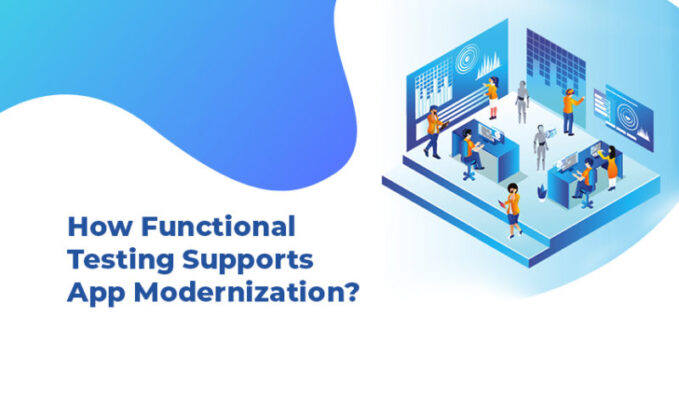
How Functional Testing Supports App Modernization?
Last updated on April 8th, 2024 at 05:55 am
Performance testing and functional testing are two basic testing types performed before deployment. Functional testing a black-box testing type, where different functions are put under test with specific inputs, their outputs are checked and measured for accuracy. It is a critical part of the software app development process and helps in checking the app’s dependency before it is sent into production. With technological advancements, the way users interact with applications is changing. Functional teams help in determining if the desired purpose of an app is delivered and user experience is as per expectations. A functional testing company leverages its testing efforts to make sure that an app is functioning according to the requirements.
With functional testing solutions, teams can resolve various issues including security concerns, accessibility issues, performance gaps, etc. All these aspects of an application are thoroughly tested and then sent for production. It also helps testers in addressing issues even while an upgrade is implemented. Automated functional tests are also used to automate recurring tasks to save time. These tests help to ensure flawless functioning of the app and software even during the next stages of software testing.
Functional testing solution providers can help in application modernization. Businesses scale up their businesses with the help of expanding their scope and performance. By introducing new features on a regular basis, firms are moving towards app modernization. It is introducing innovation into the existing processes to support customer engagement. Functional testing helps with testing the code of the app to ensure that the new features do not clash with the overall functioning of the app.
Let’s have a look at how it can help in support application modernization:
Deliver Outcomes:
A functional testing company needs to invest time in the right strategy to ensure the effective implementation of functional requirements. Functional tests are known as black-box testing because they have nothing to do with the implementation process. The main objective of these tests is to deliver what results are expected from using the application.
App Changes Do Not Impact the System:
Testers perform regression testing each time a modification is made in the code of an app. These are performed to check if bugs or errors have an impact on the overall system. Thus, it should incorporate plans from the original unit that include functional and systems tests. It helps in finding out if the app is working as per expectations.
Seamless App Functioning to Achieve Business Goals:
Teams offer end-to-end functional tests across various software units. The main focus of testing is on the overall scenarios that need critical units to integrate and deliver a certain action. Thus, all subsystems should be tested before they are integrated with another system. Each component is integrated after being tested in isolation.
It is not easy for businesses to keep up with the digital transformation taking place in all industries. In order to ensure apps deliver their expected outcomes, a functional testing company ensures testing techniques to ensure that new features or enhancements do not cause an impact on the existing quality of the apps.
Read Dive is a leading technology blog focusing on different domains like Blockchain, AI, Chatbot, Fintech, Health Tech, Software Development and Testing. For guest blogging, please feel free to contact at readdive@gmail.com.
